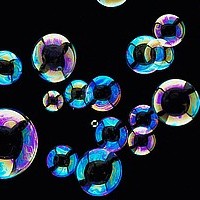 |
|
Is antibacterial soap any better than regular soap?
It seems like everything is "antibacterial" these days. About 75 percent of liquid soaps currently on shelves in American grocery stores display that word on their labels, and we are constantly adding new antibacterial products to our cleansing arsenals. So are we cleaner now than ever before? Some experts say no.
First let's take a look at how soap works on a chemical level. To make soap, you need to combine an acid and a base (or alkali). The acid is fat (fatty acids and triglycerides), and the base is sodium hydroxide (NaOH). The mixture causes the fatty acids to separate from the triglycerides and fuse with the hydroxide ions, forming a salt that we call "soap." Soap has two main functions: 1. Decrease water's surface tension
2. Bind to dirt, oil and bacteria
It can do these things because one part of the soap molecule is hydrophilic (water-binding) and the other is hydrophobic (water-repellent). The hydrophilic part allows the hydrophobic fatty acids to come into contact with other hydrophobic substances, such as the dirt on the surface that is being cleaned. When the grime adheres to the soap's fatty acids, it becomes encapsulated in droplets of water. Dirt, oil and bacteria are easily scrubbed off and washed away in this suspended state. So ordinary soap does get rid of bacteria. But does antibacterial soap get rid of even more?
Possibly. But there are several main points to consider in our antibacterial craze: The antibacterial components of soaps (usually triclosan or, less commonly, triclocarbon) need to be left on a surface for about two minutes in order to work. Most people are not this patient, and end up washing off the soap before the antibacterial ingredients can do their job. Some scientists theorize that bacteria may develop a resistance to bactericidal agents over time. Some bacteria actually benefit us. The normal population of bacteria on our bodies not only eats our sweat, but also helps defend us against truly harmful, invasive bacteria. Many common diseases are viral in nature, anyway, and are therefore not prevented by antibacterial products.
According to the Centers for Disease Control and Prevention (CDC), antibacterial soaps are not necessary, but washing your hands thoroughly with ordinary soap and warm water is one of the most effective ways to ward off infection.
For more interesting information, see www.howstuffworks.com This information is from their site.
Purchase handmade artisan soap from Soyphisticated Candles, and clean your hands and body the right way. Just click on the page link in the menu to your right, and start shopping! |